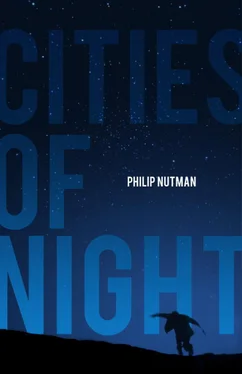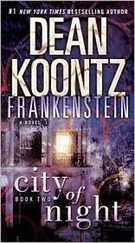Philip Nutman - Cities of Night
Здесь есть возможность читать онлайн «Philip Nutman - Cities of Night» весь текст электронной книги совершенно бесплатно (целиком полную версию без сокращений). В некоторых случаях можно слушать аудио, скачать через торрент в формате fb2 и присутствует краткое содержание. Город: Toronto, Год выпуска: 2012, ISBN: 2012, Издательство: ChiZine Publications, Жанр: Ужасы и Мистика, на английском языке. Описание произведения, (предисловие) а так же отзывы посетителей доступны на портале библиотеки ЛибКат.
- Название:Cities of Night
- Автор:
- Издательство:ChiZine Publications
- Жанр:
- Год:2012
- Город:Toronto
- ISBN:978-1-92685-185-3
- Рейтинг книги:4 / 5. Голосов: 1
-
Избранное:Добавить в избранное
- Отзывы:
-
Ваша оценка:
- 80
- 1
- 2
- 3
- 4
- 5
Cities of Night: краткое содержание, описание и аннотация
Предлагаем к чтению аннотацию, описание, краткое содержание или предисловие (зависит от того, что написал сам автор книги «Cities of Night»). Если вы не нашли необходимую информацию о книге — напишите в комментариях, мы постараемся отыскать её.
Eight cities.
Three continents.
One voice.
From Atlanta to Blackpool, London to New York, from Rome, Italy to Albuquerque, New Mexico via Hollyweird and the city of Lost Angels, all are cities of night.
And the night is forever. Now.
Cities of Night — читать онлайн бесплатно полную книгу (весь текст) целиком
Ниже представлен текст книги, разбитый по страницам. Система сохранения места последней прочитанной страницы, позволяет с удобством читать онлайн бесплатно книгу «Cities of Night», без необходимости каждый раз заново искать на чём Вы остановились. Поставьте закладку, и сможете в любой момент перейти на страницу, на которой закончили чтение.
Интервал:
Закладка:
The journey, conducted nonstop at The Great Western’s maximum speed of an un-Godly — or so Van Helsing believed — sixty seven miles-per-hour, took less than two hours to reach its destination — a journey which, the Professor thanked Providence, had passed in silence due to the Baroness’s absorption in Mr. Dickens’s latest work, Great Expectations.
But as the train exited the Box Tunnel, through the smoke-begrimed window, a vista of unprecedented aesthetic delight captured Van Helsing’s eyes. Like Rome and Jerusalem and many another, the city of Bath — named Aquae Sulis after the goddess Sul Minerva, the Roman Goddess of Wisdom, of Arts and Sciences, and of War — was said to be built upon seven hills, though in fact, it was founded not on a hill but in the valley of the river Avon.
A carriage met them at Bath Spa Station and took them — at a speed seemingly only slightly less than that of The Great Western, much to Van Helsing’s consternation — to the Baroness’s pied-a-terre at the Royal Crescent, where the Professor was relieved to escape the fog of his companion’s cigarillos.
Van Helsing’s Journal. September 15th. Early evening.
I am tired, but ’tis early, for the sun has not yet set. Traveling in that a-cursed locomotive has, I fear, wearied me, for God did not mean for man to journey at such speed. There is, however, work to be done, for time is of the essence. Again, alas, I get ahead of myself.
The Baroness, whom I know through our mutual work with Mr. Chadwick, spoke only for a few minutes when she came to visit my chambers before I agree to join her on this journey to Bath. We share a mutual concern for the plight of the young, and when she tell me of the disappearances of little ones, for she is a mother, and have two children by her late husband, I could not say no to her request to accompany her.
These “disappearances” appear no simple case of the children of the lower classes, the sons and daughters of working men and women, gin-besotted, who allow their offspring to wander and fall prey to Fate or the machinations of ruffians, or are smite down by their parents in fits of drunken rage, then the consequence of which are hid from the eyes of Justice under the pretence of an accident. No. Those who have disappeared are the sons and daughters of well-to-do families who vanish from their beds after saying their prayers. For six months this has occurred in this fair city; twelve children in all, two a month, boy and girl, none older than eleven. The Baroness, who has many social connections, learned of this through the vexation of an old friend, a former paramour of Lord Cadbury, who now resides in Bath. This poor woman, recently widowed like the Baroness herself, is one of those who has lost a little one. Furthermore, rumour has now spread like the Great Fire which cleansed London, and fearful parents speak in hushed tongue of some Evil which is stalking the young of Bath; an Evil which seeks to destroy the next generation of Bathonians.
Experience has taught me that rumour which take root and becomes powerful like superstition often mirrors a social hysteria which spreads like the plague. Yet for all groundless superstition, often-times the cause is a grain of sand which chafe like the particulate which lodges inside the Oyster and eventually grow into a pearl: hard, unyielding, resolute — and real. In growing, it become not a substance of beauty but a black malignancy, reflecting the nature of its origin. Knowing of my occult interests, my study of secret societies, and arcane lore, the Baroness, who, for one of woman-kind show good intellect aside that curse and blessing of all who are of the fairer sex — often wild “instinct” — has conducted something of an inquiry into the disappearances which have made fearful the people of this fair city.
(And fair it is because it does not depend on the Industrial scourge for its well-being, being founded by the Roman conquerors as a resort renowned for its healing waters which flow in hot torrents from one of the most potent natural Spas in the British Isles and make it long a destination of the wealthy and famous. Surrounded by the lush farmlands of the county of Somerset, it is a rich center of produce to be sent to London and nearby Bristol, that western port city.)
But I digress when I should be speaking of the hushed voices which whisper of degenerate behaviours orchestrated by one Lord Manfred, a recent habitué of the city, and his social circle which encompass many lower members of European royalty.
Bath, the Baroness informs me, also has long held a reputation as a site of indulgence for those of money and power. Yet for all this city’s bounty and seeming grace, a darkness flows in the waters which bubble and froth from deep inside the Earth. Bath, from that which I have learned from a hasty reading of materials gathered with speed from the British Museum, is a haunted place filled with spectres and phantoms, a nexus of timeless energies that seem to attract those who harbour dark desires.
The Garrick’s Head Public House, for instance, which sits alongside The Theatre Royal on Barton Street, is well known to house a mischievous spirit who will often-time hurl a tankard of ale from the bar to the nearest wall. Along the Newbridge Road, built atop an ancient Roman thoroughfare, many a local has seen a division of spectral Roman Legionnaires marching westward in formation — and many others beside. Ancient entities do not die here, nor do they fade as sunset into the arms of eternal night. Some strange force keeps the dead here as Un-dead. This is not new to me for I have witnessed many things in my travels which defy the will of God and make the mind of scientific reason mad with contradiction against the law of Nature Herself.
The clock chimes seven. I shall write more later, for it is time to make my toilet and dress for Lord Manfred’s Masquerade at the Pump Room. Baroness Lewis has made provision for us to attend this gathering in honour of the Mayor. Her belief is this soirée is a prelude to events more akin to the proclivities of Sir Francis Dashwood of High Wycombe and his “Monks of Medmenham,” those corrupt libertines who caroused through the ruins of that old Abbey along the Thames over one hundred years ago.
Van Helsing partook of a cold bath, despite the protestations of the maid who thought him mad, and dressed with customary haste for he loathed to waste time. Yet it was more than impatience with the ritual of dressing well which stoked his fires; the Professor’s curiosity was aroused, but he was driven by the consideration that children were at risk and had fallen prey to something far more insidious than human evil.
On the stroke of eight o’clock, Van Helsing and Baroness Lewis departed the grandiose sweep of the Royal Crescent in a fine brougham which slowly navigated the cobbled street, affording them a view of acclaimed architect John Wood the Younger’s masterpiece of design and building with its one hundred Ionic columns supporting a continuous cornice over two hundred yards long. Their carriage dipped down into the eastern corner of the Royal Victoria Park towards the Upper Bristol Road, then left towards Queen Square and Milsom Street and down to the Abbey and the Pump Room, the focal point of the city’s social life since Richard “Beau” Nash had transformed the crumbling, walled Medieval fortress into a glorious expanse of revelry in the early eighteenth century.
Gas lamps guttered as the brougham made its way towards its destination, the ornate confines of the chambers situated alongside the Roman Baths, where the wealthy afflicted with various diseases came to drink the mineral waters which ran beneath the streets, and thus named the Pump Room.
Van Helsing’s observant eyes drank in every detail of the breathtaking Palladian architecture with which Wood the Elder and the Younger had transformed the city into a remarkable vista of Georgian splendour. “Beau” Nash, who reigned as “King of Bath” for fifty years, had turned the city into the queen and casino of the west. Under the hand of the man who invented his own rules for society, especially in the realm of civic entertainment, and sometimes pushed those rules beyond all reasonable limits, the city became a center of fashion. But that was the eighteenth century, and this was now 1861, the twenty-fourth year of Victoria’s reign, not Nash’s. The town — for its size, it had always been a town rather than a true city — had returned to a place to live in rather than a meeting point of gay birds of passage. Those who remembered the wild days of gambling, cockfights on the Abby Green, and masked balls at which behaviour unbecoming gentlemen was rife, now considered Bath a provincial municipality peopled by superannuated celibates of both sexes — admirals and post-captains, generals and majors, lawyers and clergy. Which is why Lord Manfred’s parties over the past six months had caused such turbulent ripples on the calm surface of this genteel retreat from the grime and hurly-burly of London.
Читать дальшеИнтервал:
Закладка:
Похожие книги на «Cities of Night»
Представляем Вашему вниманию похожие книги на «Cities of Night» списком для выбора. Мы отобрали схожую по названию и смыслу литературу в надежде предоставить читателям больше вариантов отыскать новые, интересные, ещё непрочитанные произведения.
Обсуждение, отзывы о книге «Cities of Night» и просто собственные мнения читателей. Оставьте ваши комментарии, напишите, что Вы думаете о произведении, его смысле или главных героях. Укажите что конкретно понравилось, а что нет, и почему Вы так считаете.












